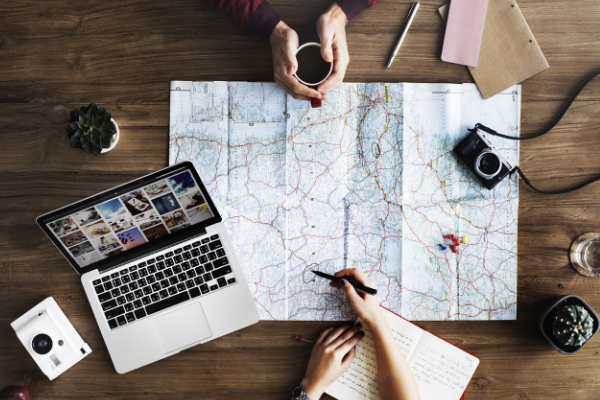What if Your Team Were All Digital Nomads?
The ‘great work from home experiment’ – that’s what I keep hearing when it comes to COVID and the disruption of our workplaces.
But let’s take a moment to look back at pre-COVID work life.
Before the outbreak of coronavirus, remote working was for the chosen few, and flexible working had to be ‘considered’. Nothing quite says, “I don’t trust you” than your working from home request to be denied.
The frustrating part, of course, was that flexible working and remote working was too often handed out to leaders or managers; providing the sense that in some way people had to earn the right to be able to work from anywhere.
According to data by the ONS, pre-COVID, only 5% of the UK workforce worked from home. A laughable figure when we all now sit here in 2020 working from home due to a global pandemic.
The pre-COVID attitude towards remote or flexible working in the UK was quietly frankly archaic.
There was a distinct belief that if you’re working from home, you’re just not working. And if you’re working flexibly, then you’re just not dedicated to your job or your career. This is what is known by sociologists as ‘flexibility stigma’. As detailed in the research by Alex Soojung-Kim Pang in his book SHORTER, “flexible workers have always been at risk of being branded as less ambitious, unreliable, or being seen as creating extra work for others.”
Research has shown that flexible working in most companies is an exception, not an option.
These outdated mindsets have not only held a marginal amount of people back from working more productively and being healthier. For example, women are more likely to be impacted by flexibility stigma. These baseless beliefs have held back the entire workforce— including people with disabilities and everyone who is a parent.
If there’s one silver lining that can be taken from the storm of COVID-19, it’s that working from home does work and that now, businesses have zero excuses not to think differently about their working hours or where people work.
So in the hope of building a new workplace utopia, I beg to question, what if we put COVID-19 aside for a moment, and take working from home a step further – what if your team were all digital nomads?

What is a Digital Nomad?
The best definition to describe a digital nomad is as follows;
“Digital nomads are individuals who are location-independent and use technology to perform their job. Digital nomads work remotely, rather than being physically present in an office.”
Since the digital boom of the 2000s digital nomads have been increasing, and according to one study the lifestyle trend is set to reach 1 billion people by 2035.
One study by Stanford University, even found that remote workers were 13% more productive than in-office workers.
It may seem like a utopian concept to many businesses at present, but simply look at the increase in outsourcing. It’s now common to find many businesses outsourcing roles to other countries, so why can’t it be done with their own employees?
You Could Provide Ultimate Work-Life Balance

Jessica Gatliff, Digital Nomad & Data Research Analyst at Free-Hotspot.com
Being a digital nomad has definitely improved my work-life balance. Not only is the working environment less stressful, but I can finally do things my way. I have my own schedule; I work as much as I want, I am more motivated, and I can work from anywhere in the world.
Stress is the silent pandemic we should all really be worried about.
In 2018/2019 data from Health & Safety England, revealed 600,000 people suffered with workplace-related stress, anxiety or depression.
Stress is a symptom of a poor work-life experience, and right now across the UK, stress accounts for 90% of illness and disease. But we don’t talk about stress like it’s a problem because most of us are still working through it – which means to employers it’s not a problem because we’re still showing up, even if we’re not actually present or well.
However, if more businesses offered teams the opportunity to become a digital nomad, the ultimate remote working experience could be pursued.
People could decide to live in other countries, or even other areas of the same country to enhance their health.
Furthermore, those with particular illnesses could seek a better lifestyle in another destination without the worry to have to replace their income. Imagine if you’re someone suffering from seasonal affective disorder (SAD), something which impacts 1 in 3 people; you could move to a brighter, warmer climate where your wellbeing would instantly be improved.
You Could Enhance Creativity and Innovation

Barbara Maheshwari
Digital Nomad and CEO of Remote Bob
Every country I have visited over the last two years have left a big impact on the way I think or solve a problem. I got to see different strategies for dealing with problems or creative solutions as answers to those problems based on culture, work ethics and professional development. As I observe people directly in the action of creative thinking, I think that we can all broaden our horizons, both personally and professionally.
In order for your business to remain agile and resilient to the hyper-speed of change in your industry, it’s become a necessity to increase creativity and innovation.
Many businesses believe in this so much; there has been a sharp increase in days spent purely on innovation hacking. They are allowing teams the time and space to work on fresh ideas. Google is notorious for this.
But in most businesses, we keep people in the same space and the same place and think this can somehow foster creativity.
If you know anything about creativity, you’ll know it’s ignited through variety, new experiences, and attempting risk; not from the same repetitive habits we drum into people in many of the workplaces that exist today.
In one study on creativity by Neuroscientists, it was found that those who are naturally more creative, live more creative lifestyles. They travel and have hobbies.
Imagine building a culture of digital nomads that are so inspired on a daily and weekly basis by their new experiences, that you have a constant tap of new ideas and innovations to trial in your business.
You Could Increase Team Self-Development
Empathy and emotional intelligence are the hard skills of the future. These are natural human abilities, but they require work and self-realisation. An awareness of one’s own impact on the world around them creates a stronger ability to make conscious decisions.
If we are to still have jobs when the artificial intelligence revolution booms, it is these skills that will stand us in good stead. We can automate the processes, but enhance our human to human interactions.
At present, we still bundle people into learning traditional hard skills and career ladders; self-development in the realms of making someone the very best version of themselves where they feel confident, fulfilled and engaged, is rare to find in company culture.
However, when you present people with the opportunity to develop their skills in a personal and individualistic approach, they are not only more engaged with their learning experience, but they also understand more about which skills they need, rather than these skills being dictated by someone who does not know their role or their personal goals.
How does this relate to being a digital nomad? – Those people who have made a choice to live a nomadic lifestyle are continuously working on their personal and self-development as they explore new parts of the world and other cultures. These experiences push people out of their comfort zones and force them into a state of personal development.
You Could Have an International Team

Jackson Howell
people working remotely are assessed on their productivity, and not if they are sat at a desk. I don’t mind where my teamwork, and with 14 of us in Riselabs spread over the EU and the world, we all come together to work online – regardless of time and location. Working from home can be challenging, and it’s difficult for some to adjust to the non-office environment – but the pros ultimately outweigh the cons.
The boundaries of the world no longer exist. We can start a business anywhere, hire anyone from anywhere in the world, and move products and services around the world. Having an international team was once the sign of a hugely successful business, now it’s becoming a common norm in the operations of a business.
The ability to have an international team offers diverse benefits within itself.
You gain a more diverse workforce, which increases your businesses ability for diversity and inclusion. And again let’s not forget that diversity has also been proven to enhance business innovation and creativity.
As digital nomads traditionally travel all over the world, you could hire someone who can constantly give you insights and updates about the biggest growing markets in the world. First hand experience can often say more about this than bias data.
You Could Help Save the Planet

Stephanie Conway
I didn’t want to take Anthony Bourdain or David Attenborough’s word for how the world was. I wanted to take a slice out of life and learn by experiencing the world. And thats exactly what happened. I was caught in a 7.0 earthquake in Lombok, Indonesia in 2018 whilst living and working abroad as a digital nomad. The events surrounding that earthquake changed my life forever. I stayed behind to help those who suffered the worst at the epicentre. Entire communities were left homeless and families had lost loved ones
Admittedly this may seem far fetched if we have teams flying all around the world – you’re probably thinking, “this isn’t environmentally friendly at all!”.
However, digital nomads are more often the most environmentally conscious people in the world. The evidence for this lies in their lifestyle, their choices, and their experiences.
First and foremost, digital nomads live a hugely minimalist lifestyle. There is only so much you can fit in a backpack, and if it doesn’t fit, it doesn’t travel. This means their consumer habits are dramatically reduced. Digital nomads can only spend money on travel, food and accommodation, the trappings of a static lifestyle don’t even come into consideration.
Consumerism is the beast that keeps attacking our planet, and there appears to be no stopping it.
In 2020 alone, due to COVID-19, online shopping increased by 102%. But what we don’t see is how this beast and all its parts have one of the biggest environmental impacts on our natural resources.
Aside from plastic pollution, manufacturing and deforestation, small contributors that are often not even considered such as home deliveries are set to cause a rise in vehicle-based carbon emissions.
The one-click culture in the comfort of our own homes is the side effect of working from home.
If we could make people more aware of the world, and the impact that climate change is already having, plus dramatically reduce our spending habits we could start to put a pause on the disasters that are yet to arise in our environment.
While hiring digital nomads is certainly not the one solution to the environmental problem, it offers one way of creating a world where people respect the planet and can learn to live with less.
If you’re eager to learn new ways to doing things in your company culture, contact me today about company culture training or my culture consultancy.







